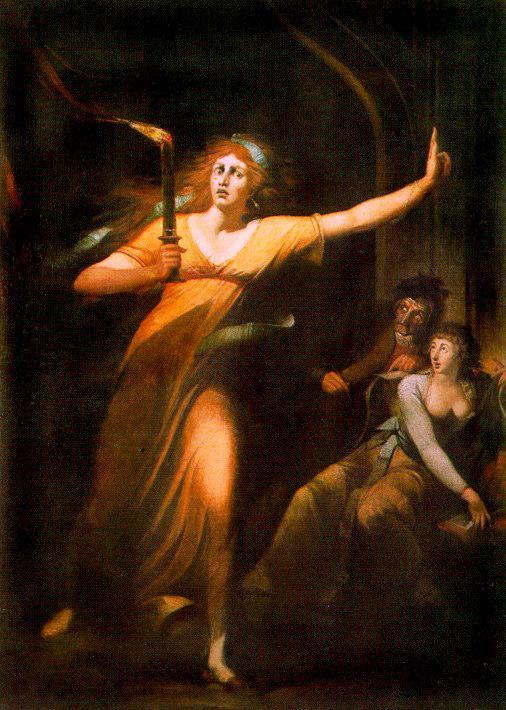Tuesday
Since I’ve encountered multiple references to Macbeth since the Capitol insurrection, it’s worth returning to the play. The more details that emerge about the event, the more Macbethian it appears. Apparently hostage taking and possibly executions were planned for certain members of Congress, and only the quick wits of a Capitol police officer kept the insurrectionists from bursting through doors of the Senate chamber while members were still in it.
Even Trump sycophant Mike Pence was a target after telling Trump it was not in his power to throw out the election results. Think of him as the Banquo of our drama.
The play, as we all know, is about a general who kills his king and then, in a classic rightwing maneuver, blames it on Antifa—excuse me, I mean the king’s two servants—whom he summarily slaughters. He gets the idea from three witches who can be regarded has projections of his own fevered imagination. Like Trump and the GOP, Macbeth and his wife sell their souls for power.
Once having achieved it, however, their paranoia only grows. Macbeth reasons that, if he himself is willing to kill for a kingship, than Banquo will be as well:
Macbeth: There is none but he
Whose being I do fear: and, under him,
My Genius is rebuked; as, it is said,
Mark Antony’s was by Caesar. He chid the sisters
When first they put the name of king upon me,
And bade them speak to him: then prophet-like
They hail’d him father to a line of kings:
Upon my head they placed a fruitless crown,
And put a barren sceptre in my gripe,
Thence to be wrench’d with an unlineal hand,
No son of mine succeeding. If ‘t be so,
For Banquo’s issue have I filed my mind;
For them the gracious Duncan have I murder’d;
Put rancours in the vessel of my peace
Only for them; and mine eternal jewel
Given to the common enemy of man,
To make them kings, the seed of Banquo kings!
Thus, like Trump complaining to his thugs know about Pence’s “betrayal,” Macbeth sends two murderers forth to dispatch his loyal companion. Like Trump, Macbeth retains plausible deniability of what they are to do:
Macbeth: Both of you
Know Banquo was your enemy.Both Murderers:True, my lord.
Macbeth: So is he mine; and in such bloody distance,
That every minute of his being thrusts
Against my near’st of life: and though I could
With barefaced power sweep him from my sight
And bid my will avouch it, yet I must not,
For certain friends that are both his and mine,
Whose loves I may not drop, but wail his fall
Who I myself struck down; and thence it is,
That I to your assistance do make love,
Masking the business from the common eye
For sundry weighty reasons.
It should be noted that Banquo, while generally contrasted with Macbeth, is not entirely innocent. While, like Pence, he knows his leader has been up to no good, he let’s his own ambitions silence his qualms. After all, the witches have told him that his heirs will be kings:
Banquo: Thou [Macbeth] hast it now: king, Cawdor, Glamis, all,
As the weird women promised, and, I fear,
Thou play’dst most foully for’t: yet it was said
It should not stand in thy posterity,
But that myself should be the root and father
Of many kings. If there come truth from them–
As upon thee, Macbeth, their speeches shine–
Why, by the verities on thee made good,
May they not be my oracles as well,
And set me up in hope?
Having killed Banquo, Macbeth finds himself alone in his last battle. Meanwhile, in a passage I’ve seen applied to Trump’s allies, Lady Macbeth finds she cannot wash away the stain of her part in her husband’s treason:
Lady Macbeth: Out, damned spot! out, I say!–One: two: why, then, ’tis time to do’t.–Hell is murky!–Fie, my lord, fie! a soldier, and afeard? What need we fear who knows it, when none can call our power to account?–Yet who would have thought the old man to have had so much blood in him.
Lady Macbeth: Here’s the smell of the blood still: all the perfumes of Arabia will not sweeten this little hand. Oh, oh, oh!
Although Trump’s GOP enablers are using disinformation tactics to distance themselves from the blood that has stained the Capitol, Shakespeare here points out that some stains go too deep to wash away.
In the past when I’ve made Trump-Macbeth comparisons, I’ve warned against seeing him as a tragic hero. His drama has been more farce than tragedy. Unlike Macbeth, Trump doesn’t lead his followers into battle but remains behind to watch the events on video. Macbeth at least has the capacity for self-reflection—“Life’s but a walking shadow”—whereas Trump is guided only by his narcissism. When Birnham Wood rises to administer an election defeat, Trump calls it fake news.
And so we have this wannabe Macbeth strutting and fretting his last hour upon the stage, soon to be heard no more. It has indeed been “a tale told by an idiot, full of sound and fury, signifying nothing.”
Previous posts applying Macbeth to Trumpism
–Oct. 2020: Trump and Covid: Tragedy or Farce
–March 2019: Are We Watching Shakespeare or Beckett?
–Jan 2019: Which Shakespeare Character Is Trump?
–Nov. 2018: Blackburn Unsexes Herself over Guns
–May 2018: Trump, Like Macbeth, Does Murder Sleep
–Dec. 2017: Trump and GOP as Shakespearean Drama
–Nov. 2016: Shakespeare Understood Trumpism
–Oct. 2016: Macduff, Trump, and “Untimely Ripped”


